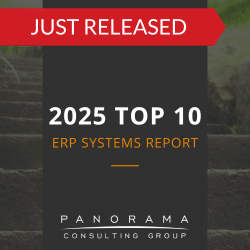An enterprise strategy is a broad term used to describe a company’s “big picture” corporate strategy. The development of this strategy deals with issues that affect a company and is typically developed at a high level in the company (i.e. the board of directors, top management team, etc.).
When developing an effective enterprise strategy, it’s important to understand what it involves, along with common obstacles you may face. This is especially true when you’re considering embarking on an ERP implementation.
ERP Selection Guide
This ERP Selection Guide will help you select technology that will support your organization for at least the next ten years.
Common Obstacles Facing the Development of an Enterprise Strategy
Before diving into how to create an enterprise strategy, it’s important to know what challenges you are likely to face. Knowing what these challenges are enables you to develop an ERP project plan designed to avoid or overcome challenges with little downtime.
1. Overcoming the Uncertainty and Opposition to Change
If your corporate strategy team or ERP project team doesn’t adopt innovative strategies, they may fall behind market rivals. This typically occurs because there’s a bias that favors the way things have always been done.
Strategy is all about change, and you must have a change mindset to achieve this. You must plan to deal with the hesitation or opposition to change you may face.
Some strategies to reduce change resistance include finding, hiring, developing and rewarding strategic thinkers who embrace and exemplify the mindset of change.
We help clients prepare for change by ensuring their project plans include critical organizational change management activities.
2. Not Planning to Meet Aggressive Timelines
An enterprise strategy team usually faces tight deadlines because of the scheduled release of board meetings or earning reports. While these have little to do with the underlying challenges of the project, they impose stressful deadlines.
The externally driven deadlines may make delivering optimal results challenging. To overcome this issue, we recommend assembling teams from several sources to deliver strategic goals that meet these deadlines. You’re only agile when you develop the ability to blend and assemble the assets needed to meet goals and deadlines.
Developing an Enterprise Strategy: What You Need to Know
While the challenges above only represent a few of the obstacles you may face, they are two of the most prevalent that enterprises must overcome. After planning for the challenges, it’s time to develop your strategy, which, for some, is a new challenge to deal with.
Here are some tips to help you along the way:
1. Determine the Goals of the Strategy
Part of an enterprise strategy is determining short- and long-term goals for the company to meet. They can be financial goals, such as increasing company revenue by 15%, or intangible goals, such as improving company-wide morale.
By determining goals, you create a direction for everyone in the organization. After the goals are set, you can develop the strategies that can help you meet the goals. This includes what needs to be done to achieve goals and who completes them.
This planning stage provides a focused blueprint for your management team to guide the rest of the company.
2. Fuel Your Planning Process with Research
It’s important to use research to fuel your planning process. Gather information about the weaknesses and strengths of your competitors to create a strategy that gives you a competitive advantage.
To create an effective enterprise strategy, you need a comprehensive understanding of your industry’s state so you can find emerging opportunities. Market research is also essential. By understanding your customers, you’ll find it is easier to attract and serve them.
All consumer needs and tastes change. For example, what customers will pay for services or products changes depending on the current economic environment.
3. Strategically Allocate Resources
At the core of any enterprise strategy is resource allocation. This is when difficult decisions are made regarding where to spend money and how to use the time of staff members to achieve goals and beat the competition. It’s important to allocate your resources in areas you believe offer the best opportunities.
Make sure you regularly look for new opportunities, too. The best opportunities result from a combination of your business capabilities (what it does better than the competition), and what the most critical customer needs are. You need to ensure the services or products you offer match well with a customer’s needs.
4. Create the Right Enterprise Strategy Team
The team you assemble for the creation of your enterprise strategy is crucial. As the CEO or top-management official, it’s up to you to ensure the right people are gathered to create a strategy that helps the company achieve success.
Remember, as your company grows, business operations become more complex and may expose weaknesses in your management team. Anticipate these changes and bring in new talent while building the skills and abilities of your current team members with ongoing training and education.
While this is true for your strategy team, it also applies to all areas of your business if you want the opportunity to achieve your long- and short-term goals. For example, the right team can help you maximize ERP business benefits.
Developing an Enterprise Strategy that Works for Your Business
The development of an enterprise strategy, regardless of your industry, is a challenging and complex process. Many business teams cannot do this without outside help due to the complexity of the process.
Request a free consultation below to discuss your needs, so you can begin to develop a strategy that helps you achieve your goals.













